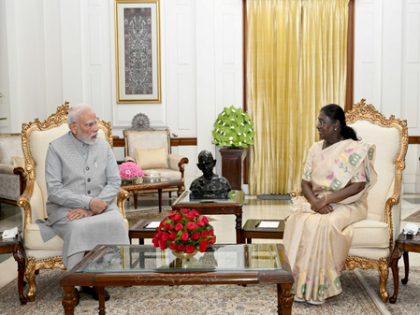After foreign visits, PM Modi briefs President Murmu - a protocol Rajiv Gandhi refused with Zail Singh
By IANS | Updated: September 7, 2025 17:15 IST2025-09-07T17:10:43+5:302025-09-07T17:15:08+5:30
New Delhi, Sep 7 In the grand corridors of power in Delhi, the relationship between the President of ...

After foreign visits, PM Modi briefs President Murmu - a protocol Rajiv Gandhi refused with Zail Singh
New Delhi, Sep 7 In the grand corridors of power in Delhi, the relationship between the President of India and the Prime Minister has often been symbolic — one ceremonial, the other executive. But the symbolism carries weight, respect, and tradition. How that tradition is upheld — or ignored — tells a deeper story of political culture, constitutional respect, and the character of leadership.
On Saturday, Prime Minister Narendra Modi called on President Droupadi Murmu at Rashtrapati Bhawan, soon after returning from a high-profile foreign visit to China and Japan. This meeting wasn’t just a formality. It was part of a deeply ingrained protocol — one that PM Modi has observed diligently through his tenure: to brief the President of India after every significant international engagement.
The Prime Minister’s visit to Tianjin, China, for the 25th Council of Heads of State of the Shanghai Cooperation Organization (SCO), involved crucial discussions on global governance reforms, counter-terrorism, and economic cooperation. On the sidelines, PM Modi held strategic bilateral meetings with President Xi Jinping and President Vladimir Putin. Upon his return, he ensured that President Murmu was personally updated — not just on the visit, but on its outcomes and implications for India.
In a post on X, RSS ideologue and Thuglak magazine editor S Gurumurthy reflected on the stark contrast between this gesture and the turbulent relationship between former President Giani Zail Singh and then Prime Minister Rajiv Gandhi.
“When I see Modi observing this protocol of briefing President after foreign visits, my mind recalls the days when Pres Zail Singh cried to me about PM Rajiv humiliating him, not observing this very protocol. Arrogant Rajiv invited disaster for himself,” Gurumurthy posted.
He went on to recount a dramatic chapter in India’s political history. According to him, President Zail Singh had felt so disregarded by Rajiv Gandhi that he sought help in drafting a letter to the Prime Minister, expressing his anguish over the perceived humiliation and downgrading of the President’s office. Gurumurthy drafted the letter; it was polished by Mulgaonkar, then editorial adviser of The Indian Express, and published on March 31, 1987.
That letter, Gurumurthy claims, was the first domino to fall in a series of scandals that shook Rajiv Gandhi’s government.
“I was arrested on 13/3 mid night,” Gurumurthy wrote. “That was the first bomb that exploded on Rajiv. After that within a week Fair Fax, within a week thereafter HDW Bribe scam, a week after VP Singh's resignation from Ministry, within days Swedish disclosure on Bofors… all in 40 days. Rajiv never recovered thereafter.”
The bitterness between Zail Singh and Rajiv Gandhi had been more than personal. It reflected a fundamental erosion of trust between the two highest constitutional offices in the land. It was a time when ego and authority clashed with dignity and decorum — and the consequences were severe.
In contrast, PM Modi’s regular briefings to the President are not just respectful gestures — they are a conscious reaffirmation of democratic values and constitutional propriety. Whether it’s President Kovind or now President Murmu, PM Modi has consistently maintained the decorum of office — even when there is no political compulsion to do so.
Where Rajiv Gandhi’s tenure witnessed a breakdown in this relationship, sowing seeds of crisis, PM Modi’s model offers an example of institutional harmony.
“It is a reminder that in a democracy, power is not just about authority, but about humility and protocol — especially when dealing with the highest office of the land,” says a political observer.
Disclaimer: This post has been auto-published from an agency feed without any modifications to the text and has not been reviewed by an editor
Open in app